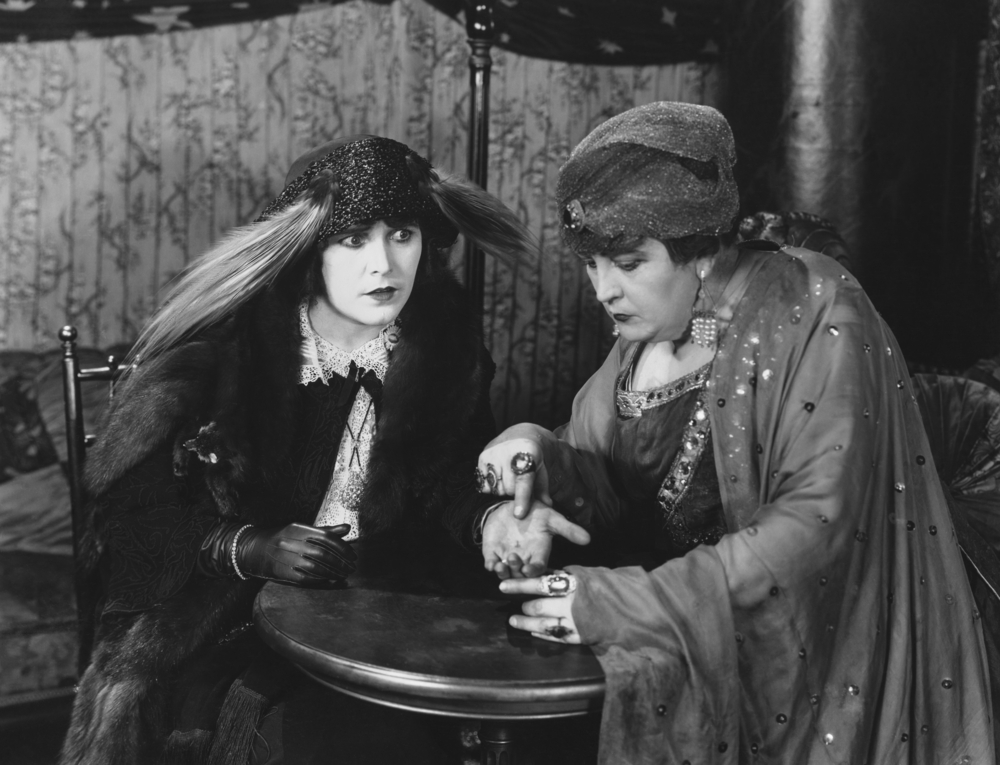Fortune-Telling: Fact, Fiction & Fantasy

Fortune-telling has been practiced for millennia. Humans have always yearned to know what the future has in store for us. Who doesn't want a glimpse — even if only for a few moments — of the cosmic plan to see if our destiny lies in riches or ruin?
Divination by laughter and cats
Some of the claimed methods for divining the future are simply bizarre. Gelomancy, for example, involves carefully listening to hysterical laughter (and even animal noises) for clues about the future. Those who practiced felidomancy claimed to know the future by observing cats; everyone knows that a black cat crossing your path predicts bad luck, but did you know that sneezing is a cat's way of predicting rain? [Countdown: 13 Halloween Superstitions & Traditions Explained]
Animal lovers won't be enthusiastic about it, but one popular method of fortune-telling practiced in ancient times called haruspication required someone to cut open a recently butchered animal and pull its intestines onto the ground to see if the bloody entrails formed any symbols that could be interpreted as a portent of things to come.
Numerology, phrenology & palmistry
Many believe that a person's name (or even how many letters are in a name) give important clues to what their future will hold. One form of divination held that bumps on the skull could accurately predict not only a person's personality but indeed their future. This "science" of phrenology was not a weird, fringe belief but instead wildly popular even among well-educated Americans and Europeans in the 1800s.
There are many hundreds of long-discredited (and self-evidently absurd) fortune-telling methods. Many equally unlikely techniques are practiced today, including numerology, reading tea leaves, consulting tarot cards, and examining the lines on a person's palm.
Dream interpretation
For millennia, dreams have universally been considered a fortune-telling tool, and there is a thriving cottage industry of books, DVDs and fortune-tellers who claim to divine your future by interpreting your dreams. For example, dreaming about an attic means that you will renew an important friendship, and dreaming about walnuts indicates that losses and financial ruin are in store. (If you repeatedly dream about eating walnuts in an attic with an important friend while you lose money, you may want to seek therapy.)
The psychology of fortune-telling
Whatever form the fortune-telling takes, the basic process is the same: seeking meaning in random patterns and phenomenon. Some essentially random event is observed in nature (animal sounds are created, dreams are recorded) or caused to happen (tea leaves are stirred, cards are shuffled), and people closely examines the results trying to make meaning or sense of them. The human brain is very good at finding (or creating) meaning even when there is none, such as in random patterns. That's why people see faces and other images in clouds, Rorschach blots, and coffee stains. This phenomenon, called pareidolia, is well known in psychology.
Validity of fortune-telling
Do any of these fortune-telling tools work? Unfortunately not, and it's not a difficult question to test. Fortune-tellers failed to predict the September 11, 2001, attacks, the recent global economic collapse, the 2011 Japanese tsunami and nuclear meltdown, and countless other important world events that would have saved innocent lives if they'd been accurately predicted.
The most obvious problem is that different fortune-telling methods discredit each other (and themselves) by giving inconsistent and contradictory predictions. Not only do answers vary between methods, but they even vary between consultations of the same signs. Two tarot card or tea leaf readings minutes apart with the same person asking the exact same question about the future should come up with the same answer, but they don't.

Let's say, for example, that someone wants to know if they will move to Paris in the next 10 years, or whether the current president will be re-elected next term. If any of these fortune-telling methods worked, they should all give the same answer; it shouldn't matter whether you ask a psychic, read tarot cards, or sprinkle a handful of flower petals on the ground and look for guidance. The answers should all be the same, since either you will or will not move to Paris, and the president either will or will not be re-elected. Instead, the answers are often no better than chance (which, in these examples, is 50/50 anyway). This is the same reason that a person can consult 10 different psychics and get 10 different answers about the future. If these fortune-telling methods are so fallible and fickle, why use them at all?
It also raises another question: If any of the methods really worked, why would there be so many? Why not stick with a proven, reliable method instead of devising literally hundreds of other fortune-telling tools? If reading tea leaves was scientifically proven to be a more accurate way to predict the future than, say, gazing at crystals or consulting the tarot, then people would naturally use the method that works. Instead, all fortune-telling methods are equally valid (or invalid) because they are all based on the same faulty premise, that reading meaning into random phenomena predicts destiny.
Even many books devoted to fortune-telling admit that the techniques are unreliable; a "Note to the Reader" prefacing "The Complete Book of Fortune" reads, "When seeking to know your Fortune by any method of divination, the results obtained must be regarded as an indication of what may happen, and must not be accepted as conclusive evidence of what will happen."
Free will vs. determinism
Many people who believe in fortune-telling don't realize that if they are right, they have answered one of the fundamental questions in philosophy, that of free will vs. determinism. Most people would prefer to believe that they control their own actions and make their own decisions in life; but anyone's ability to know the future proves them wrong. Either there is "a future" to know (or at least glimpse knowledge of) — and therefore our future is predetermined, or the future is unknowable and uncertain. Logically, you can't control your own destiny if the future is knowable.
One doesn't need to consult a psychic or fortune-teller to come up with a possible, potential vision of something that might or might not happen. Anyone can do that; if you want to know if something good or bad could possibly happen to you — from meeting a tall dark stranger to being killed in a plane crash to winning the lottery — the answer is always yes. If you want to know whether these things will happen to you, the future — as always — remains uncertain.
Benjamin Radford is deputy editor of Skeptical Inquirer science magazine and author of six books including "Scientific Paranormal Investigation: How to Solve Unexplained Mysteries." His website is www.BenjaminRadford.com.
Related:
Sign up for the Live Science daily newsletter now
Get the world’s most fascinating discoveries delivered straight to your inbox.

